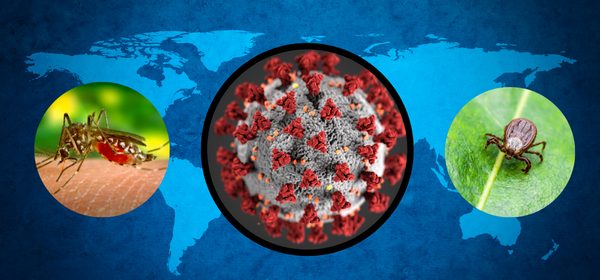Keypoint Newsletter: Upcoming Climate & Sustainability Programming
By Shannon Weiman
As climate change increasingly impacts society and human health around the globe, the world is in need of science-based solutions to mitigate the growing crisis. Keystone Symposia is assembling field leaders in sustainability science and climate medicine to collectively address current challenges and chart a path forward to a healthier planet and healthier communities.
Find out how researchers are deploying the latest scientific advances in genetics, bioengineering, technology innovation etc. to solve issues of carbon emissions, waste management, crop resilience, agricultural runoff, fertilizer and more in our upcoming joint meetings on Genetic Engineering for a Sustainable Future and The Future of Agriculture for Sustainability. Find out more below!
While it will take some time to develop and implement solutions to correct the drivers of climate change, we need to take steps now to mitigate its current impact on human health or the death toll will only continue to rise. Drawing on our strong history of bringing together scientists with public health leaders to combat global infectious diseases threats, including Malaria, Tuberculosis, HIV and COVID, we will be building on this tradition in our first conference on climate health: Climate Change & Infectious Disease Threats. Working with the Global Consortium for Climate & Health Education (GCCHE), and Wellcome Trust, the meeting integrates scientific discovery with clinical, public health and public policy perspectives to address issues of infectious disease emergence, surveillance, diagnosis, treatment and prevention. Find out more below!
Our goal is to catalyze collaboration between scientists, clinicians, public health experts and policy makers to collectively assess the threats posed by climate change and devise strategies to curtail the looming climate crisis.
Find out more about Keystone Symposia's Climate Initiatives
See Our Open Access ePanel Series and Master Class on Climate Health
Genetic Engineering for a Sustainable Future
joint meeting with The Future of Agriculture for Sustainability
Innovative and grand scale ideas will be required to solve the climate crisis, and we have an opportunity to make a real impact by gathering genetic engineering experts across plant and microbial communities to share strategies, tools, technologies, and scalable methods to address global problems. This first of its kind conference will integrate advances in genetic transformation technologies and tool development with applications in engineering plants and microbes towards more sustainable agriculture, plant feedstocks, and bioproduction. This unique meeting will bring together genetic engineers, plant scientists and microbiologists and climate scientists, across academic, government, and industry perspectives to address big picture problems and serve to develop a collective and coordinated vision for the future.
Covering topics at the forefront of science & sustainability:
- Sustainable Approaches to Replacing Animal Agriculture
- Sustainable Approaches to Plant-Based Agriculture and Food
- Enabling Tools for Plant Editing
- Engineering Next Generation Microbial Chassies
- Waste Upcycling and Bioremediation
- Bioproduction and Commercialization
The Future of Agriculture for Sustainability

joint meeting with Genetic Engineering for a Sustainable Future
This meeting will integrate recent multidisciplinary advances in genetic engineering, chemistry, imagining, and artificial intelligence that are transforming agricultural practice, productivity and sustainability. The program will cover genome editing advances side-by-side with novel engineering approaches to develop integrative strategies to solve complex problems in agriculture. This includes the advanced engineering of plants and symbiotic soil microbiota to enhance crop productivity and resilience. For example, to solve the classic problem of nitrogen fixation, the program will cover various strategies, from progress in self-fertilizing plants, to engineering bacteria to deliver fixed nitrogen, to new catalysts that chemically synthesize ammonia, to bionic leaves that combine elements of chemistry and microbial systems. In addition, approaches to control insects using gene drives or through their microbiome will be presented, addressing a core issue in agriculture. Advances in field imaging and artificial intelligence will explored with the long-term goal of integrating these systems with advances in genetic engineering.
The exceptional line-up of topics will attract researchers from disparate fields to interact and collaboratively work towards innovative and cross-disciplinary solutions for the future of agricultural sustainability. Furthermore, the conference will be co-located with the Keystone Symposium on Genetic Engineering for a Sustainable Future to enable cross-disciplinary insights and collaborations towards novel sustainable solutions enabled by genetic engineering tools and technologies.
Covering topics at the forefront of agricultural engineering and climate resilience:
- Engineering Microbial-Plant Interactions
- Preparing for Climate Change with Plant Engineering
- Low Energy Routes to Fertilizer
- Programming Plants to Respond to their Environment
- Advanced Insect Control
Climate Change & Infectious Disease Threats

in collaboration with Global Consortium for Climate & Health Education and Wellcome Trust
The impacts of climate change are increasingly prevalent around the globe, presenting urgent and complex threats to human health. In particular, climate changes are impacting the prevalence, intensity and geographic distribution of infectious diseases worldwide, putting new populations at risk and posing new challenges to human health in regions where patients, clinicians and public health departments are unprepared. As climate change accelerates in this century, the problem will only continue to grow unless we adequately assess, address and prepare for these climate-sensitive threats.
This conference will explore emerging research around how climate change is and will impact vector-borne disease and emerging zoonoses, from tropical to arctic regions around the globe. The program will span molecular to epidemiological insights, integrating our understanding of how environmental changes promote the emergence and spread of various infectious diseases with strategies for how to monitor and control such outbreaks. We will focus on critical areas of emerging climate and health science in the context of infectious disease:
- Utilizing data science and artificial intelligence tools to inform our understanding of current and future infectious disease threats.
- Immunological, epigenetic and exposomic insights into individual susceptibility to climate-sensitive infections.
- Modeling climate-sensitive health risks and outcomes to study and predict regional and global threats.
- Mitigation strategies and health co-benefits.
- Developing and implementing early warning systems to activate public health measures against outbreaks.
The conference will highlight evidence-based solutions, such as clinical and public health interventions, to protect the health of the most affected vulnerable populations. Participants will explore the policy context surrounding climate and health action to address mitigation, adaptation, and resilience solutions urgently needed.
This conference will be the first of its kind to convene scientific researchers across biomedical, clinical, technological, epidemiological, and global health communities, to engage in critical dialogues and collectively advance the science and strategies around climate change and infectious disease. Only by bringing together these different perspectives and expertise can we tackle the enormity of this emerging global health threat.
- New Tools, Technologies and Systems for Surveillance
- Modeling, Prediction and Early Warning Systems to Prevent Morbidity and Mortality
- Local, Regional and Global Issues-- Transferable Lessons & Programs
- Vulnerable Populations and Health

Help Support Climate Initiatives at Keystone Symposia by giving to Emerging Topics Program Development
Return to the September 2024 Keypoint Newsletter

Related news
Keystone Symposia Climate Initiatives
Over the course of the last 50 years, Keystone Symposia has convened conferences that connect...
Climate Change & Infectious Disease Threats ePanel ON DEMAND
As climate change alters temperatures, precipitation patterns and other habitat features around the...
Climate Health & Medicine ePanel Series Launched on Earth Day, 2022
As the impacts of climate change are becoming increasingly severe worldwide, Keystone Symposia and...



.png?width=4688&height=1563&name=donate%20banner%20(1).png)
.png?width=180&height=180&name=blog%20Michelson%20Science%202024%20ePanel%20FINAL%20(1920%20x%201080%20px).png)



